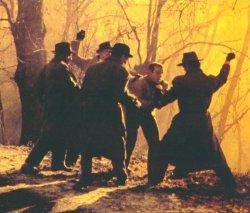
I managed to see 'So Goes the Nation' and 'When the Levee's Broke' last week. Both films were excellent as well as important social and historical documents.
'So Goes the Nation' examined the 2004 Presidential race between George Bush and John Kerry. The focus of the film is both macro and micro as it deals volunteers on the ground in Ohio, which turned out to be a swing state and an important campaign battleground, as well as interviews with the chief strategists from the Bush and Kerry camps. It is the balanced view that gives this documentary it's interesting point of view. Far from Michael Moore and Al Franken, the film tries very hard to be non partisan and show the election from both the Republican and Democratic side. The election was an easy target for a soap box documentary where you could expose the dirty tactics used againt John Kerry but they don't follow the easy target. Instead, you get a unique view into the strategy of the opponents. This deconstruction of the party battle plans doesn't diminish it's human appeal as a lot of time is spent with the volunteers on the ground and their emotional investments in the outcome of the election. It is a wonderful balance of people with political strategy and free of any apparent partisan manipulation. You can't help but marvel at how an election campaign is constructed and won, or in Kerry's case, lost.
'When the Levee's Broke' is Spike Lee's documentary about Hurricane Katrina and the destruction of New Orleans. In a four hour running time, the film is a comprehensive view of the storm and its social and political aftermath. Some might expect the outspoken Lee to have a hayday with this material which undeniably exposes America's flaws in both race and poverty. Yet Spike Lee, like 'So Goes the Nation', doesn't go the easy direction. Instead he focuses his camera on the people and allows the material speak for itself. 'When the Levee's Broke' becomes an important document of the storm and the views of the people who were abandoned by the beauracracy of the government. The issues of race and poverty are apparent in the film but Lee allows it to come to the surface naturally. His main agenda in this film is to humanize the events, to show you how a great city and a unique people are shamefully swept away in the richest and most powerful country in the world. The film is an angry, funny, sad, painful and spirited look at the United States biggest catastrophe. If you watch the news often, you might find that the film doesn't offer much new information but it doesn't matter - it offers empathy and humanity. It shares the horror of being black and poor in America as well as the horror of Katrina itself. It is a humbling documentary and one well worth seeing.



